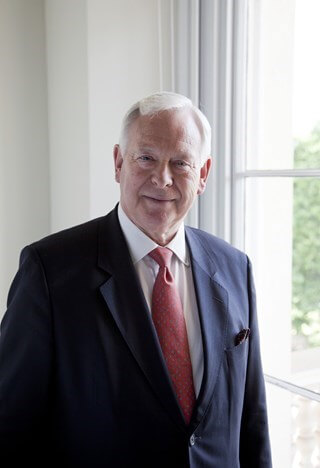Throughout his career John Parker was a passionate advocate of harnessing the benefits of economic growth to improve quality of life, address society’s challenges, strengthen social cohesion, and, critically, to provide the education and training that give young people real opportunity.
Born into a farming family in Northern Ireland, he studied naval architecture and mechanical engineering at Belfast College of Technology and Queen’s University Belfast. He joined the ship design team at Harland and Wolff where he progressed into senior management positions.
He was appointed Managing Director of shipbuilders Austin and Pickersgill in Sunderland in 1974 and, following the nationalisation of the shipbuilding industry, he joined the Board of the British Shipbuilders Corporation, later becoming Deputy Chief Executive. He returned to Harland and Wolff in the early 1980s as Chair and Chief Executive to lead a turnaround in the yard’s fortunes and transfer it into the private sector.
Sir John joined Babcock International plc as CEO in 1993 – later becoming Chair as well – and again transformed the company. In 1997, he became a Non-Executive Director of British Gas, which led to his becoming Chair of the Lattice Group on its demerger from BG Group in 2000. Lattice merged with National Grid in 2002 and Sir John became Chair of the combined company, National Grid Transco.
He also held a host of non-executive directorships, including the Industrial Development Board of Northern Ireland, British Coal Corporation, GKN, BG, and Brambles Industries.
Elected to the Royal Academy of Engineering as one of its youngest Fellows in 1983, Sir John is also an Elder Brother of Trinity House (2010); a Visiting Fellow of the University of Oxford; a member of the General Committee of Lloyd’s Register of Shipping; Vice President of The Royal Navy and Marines Charity; and a governor of the Royal National Lifeboat Institution. He is a recipient of honorary doctorates from several universities in the UK and Ireland. He has been President of the Royal Institution of Naval Architects, Prime Warden of the Worshipful Company of Shipwrights, an Honorary Freeman of the Worshipful Company of Fuellers and the Tallow Chandlers Livery Company, and President of the Smeatonian Society of Civil Engineers.
He led National Grid’s Young Offenders into Work programme and served government on the Prime Minister’s Business Council for Britain, the Defence Academy Advisory Board, the Asia Task Force, and was Deputy Chairman of the White Ensign Association.

Sir John Parker
- 1942 Born 8 April in County Down, Northern Ireland
- 1958 Following education at Newcastle Technical High School, County Down, he joins Harland and Wolff as a student apprentice (Naval Architect)
- 1958 Commences naval architecture and mechanical engineering studies at the Belfast College of Technology and Queen’s University Belfast
- 1964 Joins ship design team at Harland and Wolff
- 1974 Appointed Managing Director of Austin and Pickersgill (Sunderland)
- 1978 Joins Board of British Shipbuilders Corporation, later becoming Deputy Chief Executive
- 1983 Elected Fellow of the Fellowship of Engineering
- 1983 Returns to Harland and Wolff as Chair and Chief Executive
- 1993 Appointed CEO of Babcock International, becoming Chair the following year
- 1999 Appointed Chairman of Firth Rixson
- 2000 Appointed Deputy Chair of P&O Princess Cruises
- 2000 Appointed Chair of Lattice Group
- 2001 Knighted for services to the defence and shipbuilding industries
- 2002 Appointed Chair of RMC Group (leads sale to Cernex in 2005)
- 2002 Becomes Chair of National Grid
- 2004 Becomes Chair of Court of the Bank of England
- 2005 Becomes Chair of P&O, leading its sale to DP World in 2006
- 2006 Appointed Chancellor of the University of Southampton, serving for five years
- 2007 Becomes Joint Chair of Mondi
- 2008 Becomes Chair of BVT Joint Venture
- 2009 Becomes Chair of Anglo American
- 2011 Appointed President of the Royal Academy of Engineering
